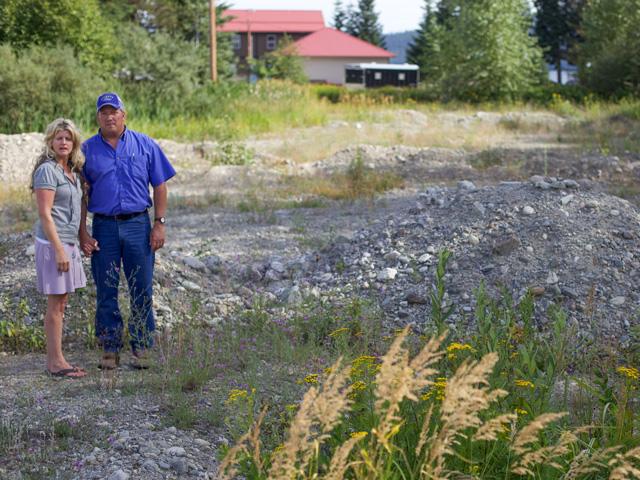Idaho Family Fights Wetlands Designation
A 15-Year Court Battle Over EPA Wetland Determination Gets Second Hearing Before High Court
OMAHA (DTN) -- For the second time in nine years, Idaho couple Michael and Chantell Sackett will have their battle over a wetlands designation heard by the U.S. Supreme Court on a parcel that is roughly two-thirds an acre in size.
The Supreme Court on Monday granted a new hearing in the Sacketts' long-standing battle with EPA to decide whether the Ninth Circuit Court of Appeals followed "the proper tests for determining whether wetlands are 'waters of the United States' under the Clean Water Act."
The case involving wetlands on a two-thirds acre housing lot could have significant ramifications for farmers, ranchers and other landowners when it comes to how courts, EPA and the Army Corps of Engineers determine the proper test for defining whether a wetland is considered waters of the U.S.
The Sacketts, meanwhile, have been locked in a 15-year legal battle with EPA and the Corps of Engineers over their plans to build a home in Priest Lake, Idaho, after EPA claimed the property contained a wetland.
In 2012, the Supreme Court ruled in favor of the Sacketts, concluding in a unanimous opinion that landowners did have legal standing to challenge Clean Water Act determinations by EPA. Before that ruling, landowners were not able to legally challenge EPA wetland determinations.
P[L1] D[0x0] M[300x250] OOP[F] ADUNIT[] T[]
The court case comes as the Biden administration is in the middle of the third rewrite to define waters of the U.S. since the Obama administration first wrote its rule in 2015. Following legal challenges to the Obama-era rule, the Trump administration withdrew it in 2017 and began its own rewrite, creating the Navigable Waters Protection Rule. That rule, backed by farm and ranch groups, was also challenged in court and withdrawn last year by Biden's EPA.
The Sacketts, aided by the Pacific Legal Foundation, filed a petition with the Supreme Court last September asking the court to reconsider a ruling handed down by justices in 2006 in Rapanos v. U.S. In Rapanos, the court offered a plurality opinion over regulation of wetlands. Four Justices, led by the opinion author, the late Justice Antonin Scalia, ruled that only wetlands with continuous connections to surface water can be regulated. Justice Anthony Kennedy, in a concurring opinion, allowed for regulation of wetlands regardless of any surface connection so long as wetlands bear a so-called "significant nexus" with traditional navigable waters.
EPA, the Army Corps, the courts and Congress have been tied up ever since trying to define "waters of the U.S." and where federal authority begins and ends when it comes to wetlands.
The Sacketts and their home permit have been in the middle of the regulatory morass ever since.
"The Sacketts' ordeal is emblematic of all that has gone wrong with the implementation of the Clean Water Act," said Damien Schiff, a senior attorney at Pacific Legal Foundation, which represents the Sacketts. "The Sacketts' lot lacks a surface water connection to any stream, creek, lake, or other water body, and it shouldn't be subject to federal regulation and permitting. The Sacketts are delighted that the court has agreed to take their case a second time, and hope the court rules to bring fairness, consistency, and a respect for private property rights to the Clean Water Act's administration."
EPA in April 2020 tried to get the case against the Sacketts halted. EPA's assistant administrator for enforcement and compliance wrote a letter withdrawing a 2008 compliance order against the Sacketts, stating in the letter EPA had decided several years earlier to no longer enforce the original wetlands ruling against the Sacketts. Still, the letter also left open the possibility of future actions on the property.
Before that letter, the Sacketts were subject to a compliance order that could have led to fines of $7,500 per day.
The Sacketts opted to continue their court case in the Ninth Circuit Court of Appeals despite EPA's letter of retreat. Then, a panel of judges from the Ninth Circuit ruled last August against the Sacketts, saying the Sacketts were violating the Clean Water Act. The Ninth Circuit panel used Justice Kennedy's logic that the wetlands on the Sacketts' lot did indeed have a "significant nexus" to an adjacent tributary and a lake, "a traditional navigable water."
The Supreme Court did not set a date Monday, but the Sackett case will be heard by the court this spring.
See "Landowners Appeal to SCOTUS" here: https://www.dtnpf.com/….
Chris Clayton can be reached at Chris.Clayton@dtn.com
Follow him on Twitter @ChrisClaytonDTN
(c) Copyright 2022 DTN, LLC. All rights reserved.






